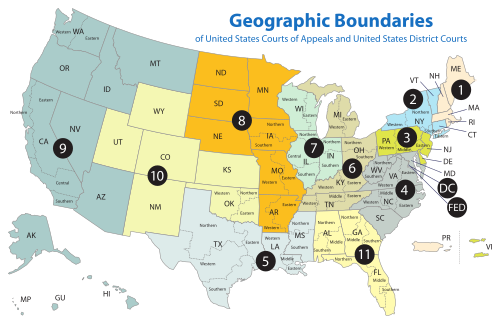| United States Court of Appeals for the Eleventh Circuit | |
|---|---|
| (11th Cir.) | |
 | |
 | |
| Location | Elbert P. Tuttle U.S. Court of Appeals Building |
| Appeals from | |
| Established | October 1, 1981 |
| Judges | 12 |
| Circuit Justice | Clarence Thomas |
| Chief Judge | William H. Pryor Jr. |
| ca11.uscourts.gov | |
The United States Court of Appeals for the Eleventh Circuit (in case citations, 11th Cir.) is a federal appellate court over the following U.S. district courts:
Contents
- Current composition of the court
- List of former judges
- Chief judges
- Succession of seats
- See also
- Notes
- References
- Citations
- Sources
- External links
- Middle District of Alabama
- Northern District of Alabama
- Southern District of Alabama
- Middle District of Florida
- Northern District of Florida
- Southern District of Florida
- Middle District of Georgia
- Northern District of Georgia
- Southern District of Georgia
These districts were originally part of the Fifth Circuit, but were split off to form the Eleventh Circuit on October 1, 1981. [1] For this reason, Fifth Circuit decisions from before this split are considered binding precedent in the Eleventh Circuit. [2] [3]
The court is based at the Elbert P. Tuttle U.S. Court of Appeals Building in Atlanta, Georgia. The building is named for Elbert Tuttle, who served as Chief Judge of the Fifth Circuit in the 1960s and was known for issuing decisions which advanced the civil rights of African-Americans.
The Eleventh Circuit is one of the 13 United States courts of appeals.
